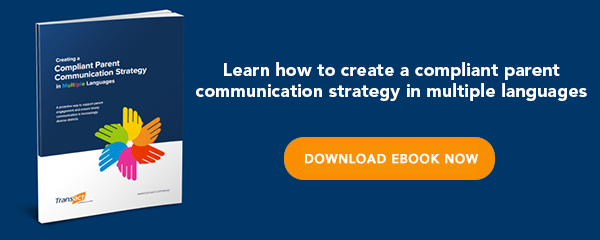Updated on May 25, 2023.
On July 1st, 2017, the Every Student Succeeds Act (ESSA) replaced No Child Left Behind (NCLB) as a rule of the land, at least in education. ESSA is the reauthorization of the Elementary and Secondary Education Act (ESEA), which was first signed into law in 1965. The law reaffirms the commitment to equal opportunity for all U.S. students
To support its goals, ESSA authorizes over $24.5 billion in funding annually for various educational programs. This funding is distributed among the ESSA titles (sections of law that different fund programs) and awarded to school districts through their state education agencies.
Book a demo to learn more about our K-12 software solution, ParentNotices:
Title I and Title III
The largest funding allocation, Title I, earmarks funds to improve basic programs and ensure economically and socially disadvantaged students receive equal opportunity for access to quality education.
Examples of programs eligible for Title I funding include academic support for low-performing students, additional teachers and paraprofessionals that focus on mathematics and English language arts support, and preschool programs.
Title III provides funding to support EL students and their families. This funding bucket has three main requirements related to ELs:
- Provide programs for ELs to attain English proficiency and acquire content knowledge.
- Provide professional development to teachers and school leaders in the area of educational strategies to best meet the academic and language needs of ELs.
- Deliver activities that promote EL parent, family and community engagement.
For more background on ESSA, as well as detailed information on how responsibilities for English Learners have shifted from Title III to Tile I under ESSA, download our eBook: "Title I & Title III Collaboration for Successful EL Programs Under ESSA". Or watch our on-demaind webinar, "ESSA Title I EL Requirements for a Title I Funded District".
ESSA Title I Required Regular Meetings With Parents of ELs
To help local education agencies (LEAs) (a.k.a school districts, Charter Schools, etc.) meet the ESSA requirement for regular meetings with the parents of English learners (ELs) (a.k.a. multilingual learners), TransACT’s ESSA ParentNotices Collection includes the notice EL-07 Meeting for Parents of English Learners: Invitation to Participate. LEAs can use this notification to organize these meetings.
Background on this ESSA Requirement
The Every Student Succeeds Act (ESSA), Title I, Section 1112 describes what must be included in an LEA’s Title I plan to meet the requirements to receive Title I funds. Included in those requirements, as described in Section 1112(e)(3)(C), is outreach districts must implement to engage the parents of ELs in the education of their children. In this section of the law (Section 1112(e)(3)(C)(ii) – Regular Meetings), it says, "Implementing an effective means of outreach to . . ." the parents of ELs ". . . shall include holding, and sending notice of opportunities for, regular meetings."
Shortly after Congress passed ESSA in late 2015, the U.S. Department of Education (USED) informed State education directors that regular meetings are not annual meetings. These meetings must be more than once a year. USED did not provide the exact or minimum number of meetings needed to meet this requirement.
It is also important to note that the required regular meetings are LEA-level meetings. LEAs (this also applies to Title I funded Charter Schools) must include all the parents of ELs in the LEA, not only those parents of English learners attending Title I funded schools or receiving Title I services. It is also important to remember that since these are LEA-level meetings, Title I schoolwide school meetings typically cannot be used to meet this requirement.
Book a demo to learn more about our K-12 software solution, ParentNotices:




